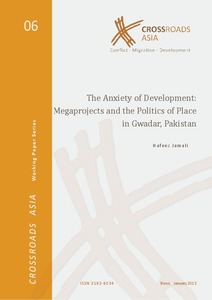Jamali, Hafeez A.: The Anxiety of Development: Megaprojects and the Politics of Place in Gwadar, Pakistan. Bonn: Competence Network Crossroads Asia: Conflict – Migration – Development, 2013. In: Baldauf, Ingeborg; Conermann, Stephan; Kreutzmann, Hermann; Nadjmabadi, Shahnaz; Reetz, Dietrich; Schetter, Conrad; Sökefeld, Martin; Hornidge, Anna‐Katharina (Hrsg.): Crossroads Asia Working Paper Series, 6.
Online-Ausgabe in bonndoc: https://hdl.handle.net/20.500.11811/129
Online-Ausgabe in bonndoc: https://hdl.handle.net/20.500.11811/129
@techreport{handle:20.500.11811/129,
author = {{Hafeez A. Jamali}},
editor = {{Ingeborg Baldauf} and {Stephan Conermann} and {Hermann Kreutzmann} and {Shahnaz Nadjmabadi} and {Dietrich Reetz} and {Conrad Schetter} and {Martin Sökefeld} and {Anna‐Katharina Hornidge}},
title = {The Anxiety of Development: Megaprojects and the Politics of Place in Gwadar, Pakistan},
publisher = {Competence Network Crossroads Asia: Conflict – Migration – Development},
year = 2013,
month = jan,
series = {Crossroads Asia Working Paper Series},
volume = 6,
note = {This working paper explores the social geography of anticipation, desire, exclusion, and control that has emerged as a result of Baloch fishermen’s entanglement with the Pakistani government’s plans to develop a large commercial seaport in the small coastal town of Gwadar. Keeping in mind the centrality of everyday experiences in generating social forms, this paper describes how development, transnationalism, and ethnic identity are (re)configured on the ground. It is based on ethnographic encounters that foreground the lived experiences and imaginations of fishermen from Med kinship group who occupy a subaltern position within the local status hierarchy. On the one hand, the promise of becoming modern citizens of the future mega city incites new desires and longings among those fishermen who facilitate their incorporation into emergent regimes of labor and entrepreneurship. On the other hand, Pakistani security forces have tightened their control over the local population by establishing a cordon sanitaire around Gwadar Port and the town. These mechanisms of control have disrupted local fishermen`s experiences of place and intimate sociality and introduced elements of exclusion, fear, and paranoia. By interrupting the fishermen`s expectations of their rightful place in the city, it compels them to think of alternate ways to confront the state’s development agenda, including peaceful protest and armed struggle.},
url = {https://hdl.handle.net/20.500.11811/129}
}
author = {{Hafeez A. Jamali}},
editor = {{Ingeborg Baldauf} and {Stephan Conermann} and {Hermann Kreutzmann} and {Shahnaz Nadjmabadi} and {Dietrich Reetz} and {Conrad Schetter} and {Martin Sökefeld} and {Anna‐Katharina Hornidge}},
title = {The Anxiety of Development: Megaprojects and the Politics of Place in Gwadar, Pakistan},
publisher = {Competence Network Crossroads Asia: Conflict – Migration – Development},
year = 2013,
month = jan,
series = {Crossroads Asia Working Paper Series},
volume = 6,
note = {This working paper explores the social geography of anticipation, desire, exclusion, and control that has emerged as a result of Baloch fishermen’s entanglement with the Pakistani government’s plans to develop a large commercial seaport in the small coastal town of Gwadar. Keeping in mind the centrality of everyday experiences in generating social forms, this paper describes how development, transnationalism, and ethnic identity are (re)configured on the ground. It is based on ethnographic encounters that foreground the lived experiences and imaginations of fishermen from Med kinship group who occupy a subaltern position within the local status hierarchy. On the one hand, the promise of becoming modern citizens of the future mega city incites new desires and longings among those fishermen who facilitate their incorporation into emergent regimes of labor and entrepreneurship. On the other hand, Pakistani security forces have tightened their control over the local population by establishing a cordon sanitaire around Gwadar Port and the town. These mechanisms of control have disrupted local fishermen`s experiences of place and intimate sociality and introduced elements of exclusion, fear, and paranoia. By interrupting the fishermen`s expectations of their rightful place in the city, it compels them to think of alternate ways to confront the state’s development agenda, including peaceful protest and armed struggle.},
url = {https://hdl.handle.net/20.500.11811/129}
}






